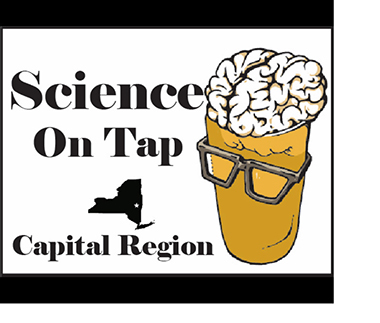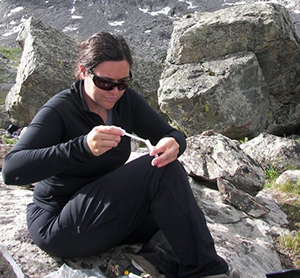Science on Tap
 |
|
Science on Tap's next event is Tuesday, 7 p.m., at Slidn' Dirty in Schenectady. (Artwork by Kristi Lamonica) |
ALBANY, N.Y. (September 19, 2017) — Anthropologist Cara Ocobock would like to see researchers communicate their work in ways the public could latch on to and apply to their lives.
“Part of that is poor science education, which means our schools are not providing a basic background in science to children,” said Ocobock. But another major problem, she said, is that scientists are terrible communicators.
“We don’t know how to speak to the general public because our graduate training beats it out of us. We are trained to speak the language of other scientists and we lose the ability to speak on a more relatable level. No one wants to hear a scientist speak a bunch of jargon — they want to hear how science relates to them, how it impacts their lives. We need to get better at doing that.”
Ocobock had no intention of getting into the forefront of that crusade in this region when she arrived at UAlbany in Fall 2016 from Grand Valley State University (GVSU), in Grand Rapids, Mich. Her studies on the interaction between anatomy, physiology, the environment and evolution, with an emphasis on the physiological and behavioral adaptations human beings need to cope with extreme conditions, would keep her busy enough.
But in January she felt another kind of extreme condition had come upon the scene with the Trump Administration. “The election happened and word was getting out about funding being slashed, attacks on the EPA, and the clearly anti-science science advisors appointed to the White House staff,” she said.
“Science is my life — and I don’t just mean my career. Technically, science is all of our lives. How many of us would not be alive today if not for some advancement in science? I know I wouldn’t!”
 |
|
Cara Ocobock on the research trail in the Wind River Range of the Wyoming Rockies. (Photo by Ryan Hutchins-Cabibi) |
Ocobock didn’t have to reach far into her past for a way “to try to combat anti-science rhetoric, but also to help educate the public about what we do and why it is actually important — especially when immediate applications of our work are not obvious.”
In her last year of graduate school at Washington University in St. Louis, she had joined a Science on Tap (or “Tap”), one of 50 such groups in university towns that began in 1998 with the Café Scientifique in Leeds, England. Meeting in informal, usually café/pub settings, Science on Tap events feature scientists talking in laymen's terms to fellow scientists and the general public about their work in a topical or even controversial area, with an aim toward demystify scientific research.
“I fell in love with the idea of bringing science to the public in a rather casual and open setting,” said Ocobock. Upon joining the faculty at GVSU, where she found the typical paucity of science outreach, she consulted the NOVA website on starting Taps and enlisted the aid of her department to find a suitable bar to run one.
“Over the two years that I was in Grand Rapids, this event grew from a tiny following of 14 attendees at the first event to more than 300 people clamoring to get into the last event before I left for Albany.”
When Ocobock set up the first local Science on Tap meeting for Feb. 28 at the Albany Pump Station restaurant, featuring four UAlbany faculty — Kristen Corbosiero of Atmospheric and Earth Sciences, Gary Kleppel of Biology, Beth Popp Berman of Sociology and Adam Gordon of Anthropology — she had “no clue how many people would show up.”
“I remember telling the restaurants we would be starting small, so keep your expectations low — this being based on my experience in Grand Rapids. Then the first event comes around and we had to jam over 120 people in the upstairs of the Pump Station. This just highlighted the need and desire for this kind of event.”
Tap events have proceeded monthly, rotating among the Pump Station, Slidn’ Dirty in Schenectady and The Ruck in Troy. The next event, scheduled for this Tuesday at 7 p.m. at Slidn’ Dirty, carries the enticing title, “The Future on Entropy,” led by UAlbany’s Ariel Caticha, professor and chair of Physics. October’s topic will be climate change.
Science on Tap has no budget. Speakers volunteer. The restaurants do not charge a room fee and even offer free dinner to the speakers. “I have a wonderful collaborator from Sage, Kristi Lamonica, who designed the logo and all of the posters for the events, and I check out any necessary AV equipment from the library each month,” said Ocobock.
“The speakers have for the most part been people who asked to give talks because they see the importance. I am pretty open to most things, and I was very lucky at the beginning. After the first event was announced, I received a bunch of emails from local scientists wanting to give talks. I am just about through that list and will start reaching out to people for talks after the New Year.
“I would love to have someone discuss cyber security and how the forensics of security breaches actually work.”
Despite what can often occur when discussion and alcohol get together in bars, Ocobock said the atmosphere has been consistently respectful. “Usually, people will come early to grab a bite to eat before the event – some eat during. I would say the majority of people are enjoying an alcoholic beverage during the talk.
“I would say overall, that scientists get far more nervous for Science on Tap talks than they do conference talks, so having a drink before or during can help calm the nerves just a little bit. So far there hasn’t been a downside to the mixing of science and booze, and it sets the tone for this being a friendlier, open environment to ask questions and start a discussion.
“Only once have I had an audience member drink a little too much and act inappropriately — but that was in Grand Rapids.”
* * * * * *
Next Tuesday’s “The Future on Entropy” talk will be followed up in October by one on climate change. Future talk/speaker suggestions may be sent to Cara Obobock. The group can also be followed on Facebook at Science on Tap Capital Region.
![]() For more news, subscribe to UAlbany's RSS headline feeds
For more news, subscribe to UAlbany's RSS headline feeds
A comprehensive public research university, the University at Albany-SUNY offers more than 120 undergraduate majors and minors and 125 master's, doctoral and graduate certificate programs. UAlbany is a leader among all New York State colleges and universities in such diverse fields as atmospheric and environmental sciences, business, education, public health,health sciences, criminal justice, emergency preparedness, engineering and applied sciences, informatics, public administration, social welfare and sociology, taught by an extensive roster of faculty experts. It also offers expanded academic and research opportunities for students through an affiliation with Albany Law School. With a curriculum enhanced by 600 study-abroad opportunities, UAlbany launches great careers.


